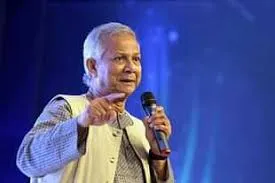Bangladesh government caretaker, Muhammad Yunus seems to fancy himself as a leader of international status, just because he has had the backing of the Democratic establishment in the United States. So much so that he is now trying to decide the future of the Indian subcontinent, by literally offering India’s Northeast to China—that is the only way to interpret the statement he made during his China visit. “The seven states of India, the eastern part of India, are called the Seven Sisters. They are a landlocked…country…region of India. They have no way to reach out to the ocean. We (Bangladesh) are the only guardian of the ocean for this region,” he said. It is not known from which geography book Yunus has been taking his lessons that he thinks India’s Northeast—which he initially misidentified as a country—is landlocked and does not have any access to the sea. Also what made him arrogate himself as the “guardian of the ocean” when his country has a coastline of a mere 710 km, and the ocean is named after India, which has thousands of kilometres of coastline along that “ocean”? Also, no state in India is landlocked because they have full access to the whole country’s coastline, with innumerable ports, giving even the remotest corner of the country full access to the sea. It’s just a matter of connectivity—building infrastructure to ensure ease of access. With the focus that the current government is giving on connectivity, this is true even for the Northeast, which has witnessed major infrastructure boom in the last ten years. Yunus cannot rewrite geopolitics by erasing India from the Indian subcontinent.
But the problem is deeper. The problem is in Yunus’ intent, rather his malicious intent. On the one hand Yunus is trying to stir the insurgency pot in the Northeast, by alluding to the supposed grievances of the region, and on the other he is offering China to use Bangladesh as a base to encircle India’s Northeast, thus increasing India’s security problems. It’s an open invitation to meddling by hitting India where it will hurt most, in the Northeast, which is connected to the rest of the country with a narrow Siliguri Corridor, commonly known as the chicken’s neck. Right from the time Yunus has been installed in power, voices have been heard in his administration about targeting the Siliguri Corridor and dismembering and thus weakening India. There is talk in Bangladesh of reviving an air force base at Lalmonirhat, near the border with India and right next to the Siliguri corridor, thus constantly threatening India. But they also have the realization that such things are easier said than done, because of India’s sheer heft, hence Yunus has resorted to wooing China.
At the same time he is speaking of being in the best of terms with India. This is sheer duplicity. The buzz is that India did not allow Yunus to travel to India, and hence he went to China. It seems the China visit was meant to teach India a lesson, and to an extent his comments were driven by spite. But then Yunus has been spiteful towards India right from the day he has taken office because of India’s strong links with his archenemy, Sheikh Hasina. He has not paid any heed to India’s concerns about the state of the minorities in his country, about how jihadis have been targeting them, how Bangladesh has been descending into anarchy and street violence was becoming the norm. He has always brushed aside India’s concerns and has accused India of exaggeration. Till date, he has not done anything to reassure India that he will not act against India’s interests. It is obvious that his deep rooted animosity towards India stems from his and his jihadis’ strong links with Pakistan. Yunus has been taking Bangladesh closer to Pakistan. It was on Islamabad’s instigation that Dhaka suggested that New Delhi should help it revive SAARC, of which Pakistan is a part—the SAARC which India has removed from among its foreign policy agenda because of the Pakistan factor. Pakistan has been weaponising Yunus to needle India, so it should not come as a surprise if the statements he made in Beijing were also fed to him by the generals of Rawalpindi HQ.
But Yunus may realise sooner than later that China does not decide its foreign policy on the whims and fancies of its vassal states. Its policies are dictated solely by its own interests and that India-China relations operate at a different level. There is no doubt that it’s a difficult relationship, especially since China does not want India to rise. But China too realises that letting relations sour with India has been one of its biggest foreign policy mistakes in the 21st century, the reason why it is making placatory noises now. That India has no reason to trust China, is a topic for another day. For the time being, Yunus should be more worried about the fact that he is offering his country on a platter to a predatory China. This is bound to make his country go belly up, the way all Chinese vassal states have gone. Yunus is suffering from delusions of grandeur. When his fall comes, it will be a hard one.























